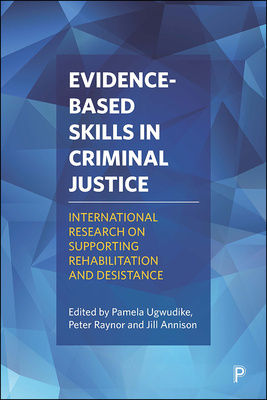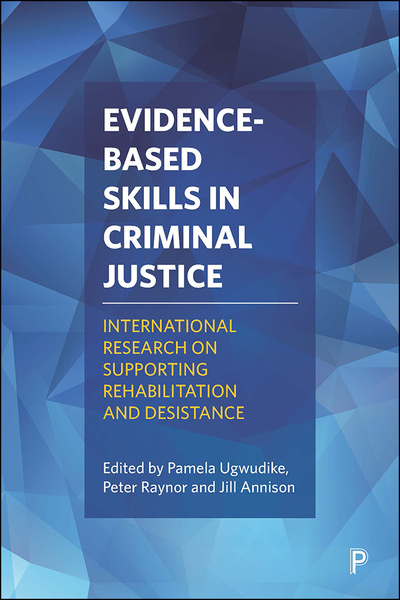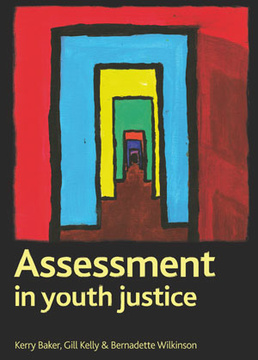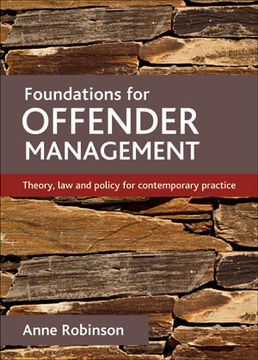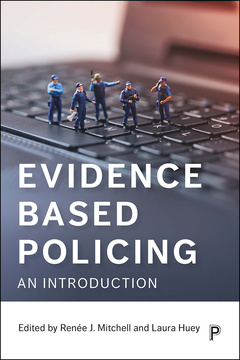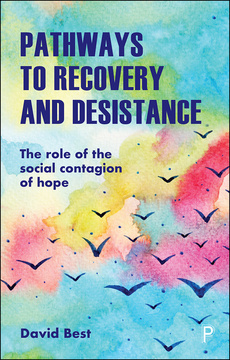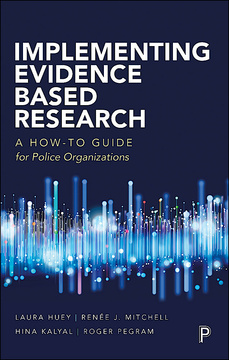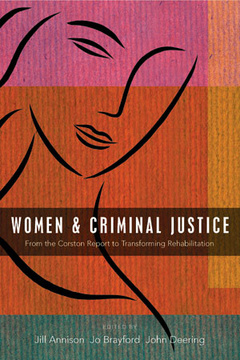Evidence-Based Skills in Criminal Justice
International Research on Supporting Rehabilitation and Desistance
Edited by Pamela Ugwudike, Peter Raynor and Jill Annison
Published
Dec 12, 2018Page count
224 pagesISBN
978-1447333012Dimensions
234 x 156 mmImprint
Policy PressPublished
Dec 20, 2017Page count
224 pagesISBN
978-1447332961Dimensions
234 x 156 mmImprint
Policy PressPublished
Dec 20, 2017Page count
224 pagesISBN
978-1447332985Imprint
Policy PressPublished
Dec 20, 2017Page count
224 pagesISBN
978-1447332992Imprint
Policy PressHow can evidence-based skills and practices reduce re-offending, support desistance, and encourage service user engagement during supervision in criminal justice settings? How can those who work with service users in these settings apply these skills and practices?
This book is the first to bring together international research on skills and practices in probation and youth justice, while exploring the wider contexts that affect their implementation in the public, private and voluntary sectors. Wide-ranging in scope, it also covers effective approaches to working with diverse groups such as ethnic minority service users, women and young people.
“…of interest to any probation practitioner, of any grade or organisation, in this book and I would encourage you to take the time to read and reflect upon its insightful contributions.” Probation Quarterly
"I’m often asked what practitioners can do to encourage and support desistance from crime. Now I know exactly what to tell them: read this book! This remarkable collection reviews the evidence base for everything from emotional work in probation to the recruitment of ex-offender engagement workers. It is an essential resource for understanding effective rehabilitation." Shadd Maruna, Professor of Criminology, University of Manchester
"A well-articulated and comparative evidence base for the construction of effective working relationships in probation practice....a must read for practitioners and policy makers." Dr Aaron Pycroft, University of Portsmouth
Pamela Ugwudike is associate professor in criminology at the University of Southampton. Her research projects have focused on criminal justice practice and they have been funded by the Welsh Government, the Youth Justice Board, the National Probation Service, and the Prison Advice and Care Trust.
Peter Raynor is a former probation officer and qualified social worker, now emeritus research professor in criminology and criminal justice at Swansea University, where he has worked since 1975.
Jill Annison is associate professor in criminal justice studies at Plymouth University. Her career as a practitioner, in teaching and as a researcher, has focused on women offenders.
Part 1: Contextualizing practice: Key theoretical, organisational and policy developments;
Chapter 1: Introduction – Effective practice skills: new directions in research ~ Pamela Ugwudike, Peter Raynor, and Jill Annison;
Chapter 2: The effective practice of staff development in England and Wales: learning from history and contemporary research ~ Maurice Vanstone;
Chapter 3: The search for impact in British probation: from programmes to skills and implementation ~ Peter Raynor;
Chapter 4: Is constructive practice still possible in a competitive environment? Findings from a case study of a community rehabilitation company in England and Wales ~ Lol Burke, Matthew Millings and Gwen Robinson;
Chapter 5: Implementation uptake: organisational factors affecting evidence-based reform in community corrections in the United States ~ Danielle S. Rudes, Faye S. Taxman, Kimberly Kras, Kimberly S. Meyer & Shannon Magnuson;
Part 2: International research on evidence‑based skills;
Chapter 6: The Risk-Need-Responsivity model: evidence diversity and integrative theory ~ Martine Herzog-Evans;
Chapter 7: Professional practices and skills in first interviews: a comparative perspective on probation practice in Spain and Belgium ~ Ester Blay and Johan Boxstaens;
Chapter 8: Desistance-related skills in Romanian probation contexts ~ Ioan Durnescu;
Chapter 9: From evidence-informed to evidence-based: the Strategic Training Initiative in Community Supervision ~ James Bonta, Guy Bourgon and Tanya Rugge;
Chapter 10: Promoting quality in probation supervision and policy transfer: evaluating the SEED programme in Romania and England ~ Angela Sorsby, Joanna Shapland and Ioan Durnescu;
Chapter 11: Supervision face-to-face contacts: the emergence of an intervention ~ Heather Toronjo and Faye S. Taxman;
Chapter 12: Understanding emotions as effective practice in English probation: the performance of emotional labour in building relationships ~
Andrew Fowler, Jake Phillips and Chalen Westaby;
Chapter 13: Staff supervision in youth justice and its relationship to skill development: findings from Australia ~ Charlene Pereira and Chris Trotter;
Part 3: Evidence-based practice with diverse groups;
Chapter 14: Evidence-based skills in Welsh youth justice settings ~ Pamela Ugwudike and Gemma Morgan;
Chapter 15: The impact of training and coaching on the development of practice skills in youth justice: findings from Australia ~ Chris Trotter;
Chapter 16: Can the recruitment of ex-offenders enhance offender engagement? An assessment of the London Probation Trust’s engagement worker role ~ Nigel Hosking and John Rico;
Chapter 17: Collaborative family work in youth justice ~ Chris Trotter;
Chapter 18: Resisting effective approaches for BAME offenders in England and Wales: the triumph of inertia ~ Patrick Williams and Pauline Durrance;
Chapter 19: The ambiguity of therapeutic justice and women offenders in England and Wales ~ Jill Annison, Tim Auburn, Daniel Gilling and Gisella Hanley Santos;
Chapter 20: Conclusion ~ Pamela Ugwudike, Jill Annison and Peter Raynor.







